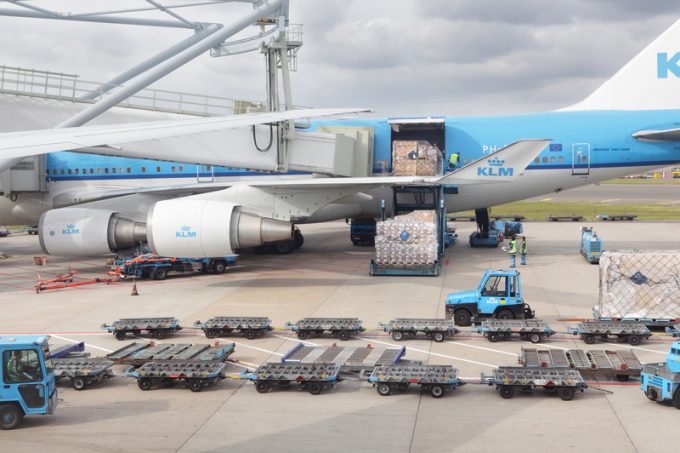Charlotte Elpers appointed VP worldwide operations at KLM Cargo
KLM Cargo today announced that it has appointed Charlotte Elpers (above) as vice president of ...
FDX: ABOUT USPS PRIVATISATIONFDX: CCO VIEWFDX: LOWER GUIDANCE FDX: DISRUPTING AIR FREIGHTFDX: FOCUS ON KEY VERTICALFDX: LTL OUTLOOKGXO: NEW LOW LINE: NEW LOW FDX: INDUSTRIAL WOESFDX: HEALTH CHECKFDX: TRADING UPDATEWMT: GREEN WOESFDX: FREIGHT BREAK-UPFDX: WAITING FOR THE SPINHON: BREAK-UP ALLUREDSV: BREACHING SUPPORTVW: BOLT-ON DEALAMZN: TOP PICK
FDX: ABOUT USPS PRIVATISATIONFDX: CCO VIEWFDX: LOWER GUIDANCE FDX: DISRUPTING AIR FREIGHTFDX: FOCUS ON KEY VERTICALFDX: LTL OUTLOOKGXO: NEW LOW LINE: NEW LOW FDX: INDUSTRIAL WOESFDX: HEALTH CHECKFDX: TRADING UPDATEWMT: GREEN WOESFDX: FREIGHT BREAK-UPFDX: WAITING FOR THE SPINHON: BREAK-UP ALLUREDSV: BREACHING SUPPORTVW: BOLT-ON DEALAMZN: TOP PICK

Russia will ban Dutch carriers from its airspace from Saturday unless landing slots at Schiphol are returned to AirBridge Cargo (ABC).
Industry sources have backed-up claims in De Telegraaf , based on a conversation with a manager of ABC in the Netherlands, Henk-Jan van Keulen, that the threats are genuine.
One source told The Loadstar flight times to Asia would increase by three to four hours if carriers couldn’t use Russian airspace.
Dutch shippers’ association Evofenedex said KLM would be worst hit, but it was also “worried” by the forced departure of many air freight operators from Schiphol.
ABC lost around half its 21 landing slots at Schiphol after the airport reached full capacity last month, which triggered IATA’s 80:20 rule.
Under IATA and EU rules, when slots are constrained, any airline which has not flown 80% of its slots as scheduled, loses its right to them.
Evofenedex said: “As of 1 November, there will be around 30% fewer freight flights at the airport, which will put pressure on the position of Schiphol.”
It added that it was vital that politics quickly regained control over the situation at Schiphol and “gives air carriers space again”.
ABC told The Loadstar it would perform flights to Schiphol as per its published winter schedule, and confirmed that use of a country’s airspace is under the authority of its civil aviation authority.
A source said: “The Dutch have failed to deal with this in an holistic manner: the bottom line is, one can’t take half of the flights of a carrier away that it has built-up over so many years.
“In the Netherlands, a democratic country, discussion is abundant but decisions are typically slow, with Schiphol, the ministry of infrastructure and KLM all pointing their fingers at one another.”
Evofenedex, which has lobbied IATA to switch to a 70:30 split, said Dutch aviation “stands or falls” with KLM, and any impact on the carrier would hit the Dutch economy.
The carrier declined to commentand neither Schiphol nor the Dutch ministry could be reached – but one source suggested the government should have taken a much stronger position than hiding behind IATA’s 80:20 rule.
“This is the Dutch failing to deal with a domestic issue, and it should have been more attentive to the consequences of such actions in the real world,” added the source.
“Apart from the drawbacks on both the Dutch economy and logistics sector, now Liege is going full blast to invest in warehouses to retain what they have gained by windfall.”
The Belgian airport announced this month that ABC had been granted slots and planned to increase the number of flights calling to 12 a week.
There is also a strong perception among air cargo players that accepting 80:20 is a protectionist move by the Dutch government to benefit AF-KLM. One executive told The Loadstar: “This has a huge stink of protectionism in the Dutch market, that was built up based on logistics.”
Another added: “Clearly, KLM is benefiting from application of 80:20; it is sad since KLM is the one that did not make cargo work at Schiphol and was even able to let its crown jewel, Martinair, go under.
“The Netherlands, as a transit and logistics country, needs a prime cargo gateway, and to have one freighter frequency pushed out by one narrowbody passenger frequency looks like bad business.”
Comment on this article